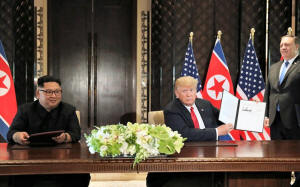|
When to end the war? North Korea, U.S. at
odds over path to peace
 Send a link to a friend
Send a link to a friend
 [July 26, 2018]
By Josh Smith [July 26, 2018]
By Josh Smith
SEOUL (Reuters) - Washington's reluctance
to declare an end to the Korean War until after North Korea abandons its
nuclear arsenal may put it at odds not only with Pyongyang, but also
with allies in South Korea.
The 1950-1953 Korean War ended in an armistice rather than a peace
treaty, leaving the U.S.-led United Nations forces technically still at
war with North Korea.
Friday marks 65th anniversary of the truce, which will be commemorated
by the United Nations Command in a ceremony in the fortified
demilitarized zone that has divided the two Koreas since the war. North
Korean veterans of the war, which left more than 1.2 million dead, will
gather in Pyongyang for a conference.
In their April summit, the leaders of North and South Korea agreed to
work this year with the United States and China, which also played a
major role in the war, to replace the armistice with a peace agreement.
In June, U.S. President Donald Trump and North Korean leader Kim Jong Un
signed a statement saying they would seek "to establish new U.S.–DPRK
relations in accordance with the desire of the peoples of the two
countries for peace and prosperity," using the initials of the North
Korea's official name, the Democratic People's Republic of Korea.

Kim has broadly committed to the "denuclearisation of the Korean
peninsula" if the United States and its allies drop their "hostile"
policies and the North has made clear it sees an official end to the
state of war as crucial to lowering tensions.
Many experts and officials in Washington, however, fear signing a peace
deal first could erode the international pressure they believe led Kim
to negotiate. It could also endanger the decades-long U.S. military
alliance with South Korea, and may undermine the justification for the
U.S. troops based on the peninsula.
"Broadly speaking, one side wants denuclearisation first, normalization
of relations later, and the other wants normalization of relations
first, then denuclearisation later," said Christopher Green, a senior
advisor at the International Crisis Group.
North Korea says it has taken steps to halt its nuclear development,
including placing a moratorium on missile and nuclear bomb testing,
demolishing its only known nuclear test site, and dismantling a rocket
facility.
American officials have praised those moves, but remain skeptical. U.S.
Secretary of State Mike Pompeo told Congress on Wednesday North Korea
was continuing to produce fuel for nuclear bombs.
A spokesperson for the U.S. State Department said while "peace on the
Korean Peninsula is a goal shared by the world," the international
community would not accept a nuclear armed North Korea.
"As we have stated before, we are committed to building a peace
mechanism with the goal of replacing the Armistice agreement when North
Korea has denuclearised," the spokesperson said in an emailed statement.
DOUBTS ON BOTH SIDES
In recent weeks Pyongyang has renewed calls for a declaration of the end
of the war, calling it the "first process for peace" and a key way the
United States can add heft to its guarantees of security.
[to top of second column]
|

President Donald Trump shows the document, that he and North Korea's
leader Kim Jong Un signed acknowledging the progress of the talks
and pledge to keep momentum going, after their summit at the Capella
Hotel on Sentosa island in Singapore June 12, 2018. At right is U.S.
Secretary of State Mike Pompeo. REUTERS/Jonathan Ernst/File Photo

"The adoption of the declaration on the termination of war is the
first and foremost process in the light of ending the extreme
hostility and establishing new relations between the DPRK and the
U.S.," North Korean state media said in a statement on Tuesday.
After Pompeo visited Pyongyang in June for talks, state media quoted
a spokesman for the North's Ministry of the Foreign Affairs
criticizing the U.S. delegation for not mentioning the idea of a
peace regime.
"It seems quite obvious that even if North Korea is negotiating
sincerely, they aren't going to be willing to give up their nuclear
capacity in the absence of a peace system that gives them regime
security," Green said.
Many officials in Washington appeared concerned that an early
declaration of peace could lead to the collapse of the U.S.-South
Korea alliance with calls for U.S. troops to leave the Korean
peninsula, he added.
OTHER PLAYERS
South Korean leaders in 1953 opposed the idea of a truce that left
the peninsula divided, and were not signatories to the armistice.
The treaty was signed by the commander of North Korea’s army, the
American commander of the U.N. Command, and the commander of the
“Chinese People’s volunteers”.
While South Korean officials say they are committed to the full
denuclearisation of North Korea, they have shown more flexibility in
the timing of a peace agreement than their U.S. allies.
South Korea’s Unification Minister Cho Myoung-gyon said on Tuesday
it is possible to declare an end to war this year.
"We are in consultations with the North and the United States in
that direction," he told a parliamentary session, adding that a
three-way declaration would be part of an initial phase of
denuclearisation.
China says it open to participating in the process.
"As an important party to the Korean Peninsula issue and a signatory
to the Korean War Armistice Agreement, China will play its role in
ending the war status and replacing the armistice with a peace
regime on the Korean Peninsula," Chinese Foreign Ministry spokesman
Geng Shuang told reporters on Wednesday.

He did not elaborate on any possible timetable.
(Additional reporting by Hyonhee Shin in Seoul, and Ben Blanchard in
Beijing. Editing by Lincoln Feast.)
[© 2018 Thomson Reuters. All rights
reserved.]
Copyright 2018 Reuters. All rights reserved. This material may not be published,
broadcast, rewritten or redistributed.
Thompson Reuters is solely responsible for this content. |